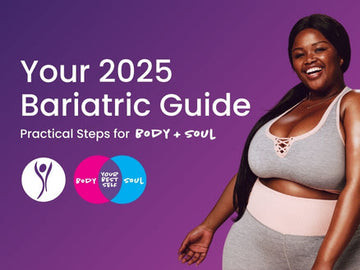by Anthony Benjamin on Oct 12, 2022

How Long Should Bariatric Patients Take Vitamins?
 Following bariatric
surgery, we recommend that a patient take daily vitamins for the rest of their life. You may
have been wondering why is this a lifelong commitment? Especially after you have lost all
the weight and are in a maintenance period. After surgery, your body has trouble absorbing
specific vitamins and minerals you would typically receive from foods. To explain things
simply, having bariatric surgery works by two different mechanics, one way is restricting
how much food and calories can be consumed at once and the other way is known as
malabsorption, which restricts how your body is absorbing nutrients. Some surgeries even use
both! While both mechanics make weight loss possible, it also invites the possibility of
vitamin deficiencies. Deficiencies can include vitamin B12, calcium, and vitamin D. It is
important to note that deficiencies can be different for each person and sometimes serious
ones have little side effects, making it hard to detect when one is present outside of
regular bloodwork. In this blog, we will discuss the importance of why bariatric patients
need to take daily vitamins to stay healthy.
Following bariatric
surgery, we recommend that a patient take daily vitamins for the rest of their life. You may
have been wondering why is this a lifelong commitment? Especially after you have lost all
the weight and are in a maintenance period. After surgery, your body has trouble absorbing
specific vitamins and minerals you would typically receive from foods. To explain things
simply, having bariatric surgery works by two different mechanics, one way is restricting
how much food and calories can be consumed at once and the other way is known as
malabsorption, which restricts how your body is absorbing nutrients. Some surgeries even use
both! While both mechanics make weight loss possible, it also invites the possibility of
vitamin deficiencies. Deficiencies can include vitamin B12, calcium, and vitamin D. It is
important to note that deficiencies can be different for each person and sometimes serious
ones have little side effects, making it hard to detect when one is present outside of
regular bloodwork. In this blog, we will discuss the importance of why bariatric patients
need to take daily vitamins to stay healthy.
Post-Surgery Information
In the first three to six months following surgery, many surgeons recommend sticking to chewable or liquid forms of supplements as these are easier to tolerate and absorb. When you think you are ready to progress to capsules or tablets, discuss options with your bariatric program.
Questions You Should Ask
There are several pertinent questions you should ask when choosing the correct supplements for yourself. Such as, do these supplements meet recommendations? How do they taste? What number of tablets, chews, or amounts of liquid is necessary to reach the suggested dose? How much do they cost? And are they readily available?
The American Society of Metabolic and Bariatric Surgery (ASMBS) is a society focused on the research, health, and wellness of bariatric patients and advocacy for obesity. The ASMBS has guidelines for each type of surgery for patients to follow when it comes to each vitamin/nutrient. This society is an excellent source of information when it comes to asking which supplements meet recommendations/guidelines.
With ProCare Health, you can rest assured that we can answer all your questions. ProCare’s products undergo a testing regimen that exceeds the industry’s quality expectations and ASMBS guidelines. After being produced in a cGMP-compliant plant in the United States, every ingredient of every lot is tested, delivering peace of mind to our customers. Our products also come in various tasty flavors that make taking your vitamins something you look forward to. We also label each product to let the consumer know just how much they should take. Our goal is to make things as easy as possible for our customers. And, finally, we focus on making our supplements cost-effective. A comparison of the top bariatric brand shows you can save 49-61% a month on supplements with ProCare Health. Check out how ProCare Health stacks up against top competitors on cost and the recommended daily amount!
What Vitamins and Minerals Do You Need Daily?
As mentioned, vitamins and minerals such as iron, vitamin B12, calcium, and vitamin D play significant roles in maintaining optimal health. Depending on the vitamin deficiency, it can sometimes be difficult and take longer to get your levels back where they need to be. That is why it is important to stay on top of routine bloodwork and have a vitamin regime. A lack of iron and vitamin B12 can lead to anemia, while low B12 can cause neurological complications such as memory loss and irritability. You may also develop bone and kidney disease due to changes in the way your body absorbs calcium and vitamin D. To ensure you are receiving enough of each vitamin and mineral, we recommend you take the following daily:
Iron
As mentioned before, the ASMBS sets guidelines for the recommended daily dose of each vitamin depending on the surgery the patient has had. According to their research, iron deficiencies are reported to be as high as 45% of patients with obesity.
Therefore, you should be taking at least 18mg of iron every day. However, if you are a female in childbearing years, have had a history of anemia, and/or have had Roux-en-Y, sleeve gastrectomy, or duodenal switch, doctors recommend that you have a dose of 45-60mg/day. Low iron can also cause tiredness, poor concentration, and frequent bouts of illness. If left untreated, low iron levels can evolve into iron deficiency anemia (IDA). IDA refers to the condition in which your blood doesn’t contain enough healthy oxygen-carrying red blood cells. Many multivitamins contain the proper amount of iron for bariatric patients. ProCare Health offers three different levels of iron in both our capsule and chewable formula to accommodate all surgery types and patients (Iron Free 18mg, & 45mg).
Calcium
You should take 1,500 mg of calcium a day to prevent calcium deficiency and bone disease. ProCare Health uses TruCal in almost all their calcium products. TruCal is derived from milk and delivers seven different minerals (Calcium, Phosphorus, Magnesium, Potassium, Zinc, Iron and Copper) all at similar levels to that of the normal mineral composition of human bones. TruCal is superior to other forms of calcium, like calcium carbonate, because it delivers more than just calcium that is needed for healthy bones. We recommend TruCal and calcium citrate over other forms of calcium, as they are easier to absorb.
Take the calcium supplements as two or three divided doses at two or three different times a day to enhance absorption. DO NOT take calcium simultaneously with your multivitamin with iron (if you choose to take one), as the iron may affect calcium absorption. The ASMBS also recommends taking these two supplements separately, for this very reason.
Vitamin D
Take 3000 IU/daily of vitamin D a day with your calcium supplement, as vitamin D helps you absorb calcium. (To calculate Vitamin D off vitamin label: 1000 IU = 25 mg). Split your vitamin D dosage between two 1,500 IU doses. If it is easier, you may take a combination calcium-vitamin D supplement if it contains the proper dosages. ProCare Health’s calcium chews and seasons Dark Chocolate Calcium Bars have 500 IU of vitamin D to aid in the absorption of your daily calcium. Check them out here!
Vitamin B12
We recommend that bariatric patients consume about 350-500 mcg/day orally or 1000ug/month intramuscularly of vitamin B12. If taken orally, it can be taken as a tablet or liquid under your tongue. If given intramuscularly, you will receive it through a monthly injection. Remember to have vitamin and mineral levels checked annually which you can do through blood tests ordered by your primary care physician.
Probiotics
Surgery may alter the balance of good and bad bacteria in your gut. This is due to the disruption of your GI tract and the potential use of antibiotics after surgery to help prevent infection. Intestinal motility and gastric acid secretion both regulate the number and type of intestinal bacteria in the gut. These are both all types of bariatric surgeries. You want to maintain a good balance of bacteria in the gut, as bacterial overgrowth can lead to vitamin deficiencies, fat malabsorption, and malnutrition. To learn more about the importance of probiotics check out the LIVE event we did with Registered Dietitian, Katie Chapmon.
Magnesium
Combined with calcium and vitamin D3, magnesium is an essential supplement because your body cannot make it. Men should receive 400-420mg/day, while women should receive 320-360mg/day. Magnesium is essential because it is vital for hundreds of metabolic processes and other crucial functions, such as producing energy and building important proteins like DNA. Magnesium can also improve blood pressure, mood, immunity support, and can control blood sugar.
ProCare Health understands the importance of magnesium so much so, that we included a 200mg daily dose in the Prenatal Bariatric Formula and the Probiotic Bariatric Formula. If you are looking for more, do not worry! We created an immunity support supplement that not only has magnesium but quercetin too! Quercetin is a powerful antioxidant that can help support a healthy immune system. Check out one of our newest products, MAG-D, here.
Vitamin B1 (Thiamine)
Vitamin B1, also known as thiamine, has a very short amount of storage in the body (around 14-18 days). This vitamin supports nerve and muscle function, especially standing and walking ability. A thiamine deficiency can present quickly and cause serious side effects if left untreated. You are at a greater risk of developing a thiamine deficiency after surgery for several reasons:
- Your stomach is smaller, which means you are restricting your energy intake. If you don’t commit yourself to a healthy vitamin and supplement regimen, you put yourself at risk of developing deficiencies.
- If you experience nausea and vomiting after surgery, you are also at risk of developing deficiencies, as you are expelling valuable nutrients from your body before they can be properly absorbed.
- Doctors have also reported thiamine deficiencies in patients who experience periods of high carbohydrate intake.
Symptoms of a thiamine deficiency range from minor to severe. Early stages of thiamine deficiency symptoms may present with anorexia, indigestion, constipation, malaise (a general sense of discomfort), heaviness and weakness in your legs, tender calf muscles, numbness in legs, and an increase in pulse rate. A severe deficiency can cause syndromes with symptoms that include ocular abnormalities, gait ataxia (abnormal or uncoordinated movements), and mental status changes.
If you suspect you have a thiamine deficiency, you’ll need the correct laboratory test to confirm it. Once a deficiency is spotted, long-term care may be needed to prevent a relapse of the condition. Bariatric patients should be made aware of the risk of vitamin deficiency post-surgery, particularly that of thiamine. “Whose side effects,” according to Bariatric Times, “may be permanent if left untreated or inadequately treated.”
The daily recommended dose of thiamine to maintain optimal levels is 1.2mg for adult men, 1.1mg for adult women, and 1.4mg for those who are pregnant and/or lactating. Exceeding these daily amounts is unlikely to cause adverse side effects.
If you’re looking for a thiamine supplement to correct thiamine deficiency, check out ProCare Health’s special formula, Once Daily Bariatric Multivitamin Capsule | Special 45, which has the increased thiamine necessary to help your body bounce back.
The Benefit of Taking a Bariatric Multivitamin
You may be overwhelmed, thinking about all the different supplements you need to take every day. Well, make your life simpler with a bariatric multivitamin. Multivitamins should be complete with iron and other trace minerals. In general, a multivitamin should contain 200% of your daily value of iron (36mg), folic acid (800mcg), thiamin (3mg), 100% of your daily value of zinc (15mg), copper (2mg), and other nutrients. A bariatric multivitamin may eliminate the need for additional vitamin D and B12 supplements. It should also be available with different levels of iron. That way, you can choose the one that best fits your needs.
Remember that you will have to take calcium supplements separate from your multivitamin. We recommend splitting your calcium citrate supplement between your morning and afternoon snacks. You want to make sure that you take your calcium and vitamin D supplements at least two hours apart from your multivitamin. Finally, avoid any gummy multivitamins as these do not always contain all the vitamins and minerals you need.
Shop ProCare Health Today
We are your one-stop-shop for all your bariatric supplemental needs. Our list of available supplements includes:
- Once Daily Bariatric Multivitamin Capsule
- Once Daily Bariatric Multivitamin Chewable
- Bariatric Multivitamin + Probiotics | 45mg Iron
- Bariatric Multivitamin | Prenatal
- Once Daily Bariatric Multivitamin Capsule | Special 45
- And more!
We hold ourselves to the highest standards to ensure that our patients receive only the best supplements the market has to offer. Are you interested in what ProCare Health can do for you? We are here to help you reach your health goals as safely and efficiently as possible. Visit our website for all your supplement and bariatric information needs.

Your 2025 Bariatric Guide: Practical Steps for Body + Soul

Your Go-To Guide for Bariatric-Friendly Travel

Exploring the Impact of Weight Loss on Bone Density

